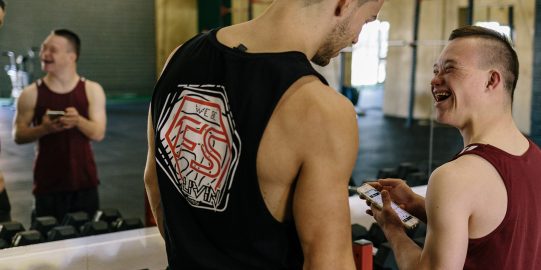Many things have changed since the early days of Augmentative and Alternative Communication (AAC) (in the 1970s and 80s). Back then, most AAC practitioners believed that certain prerequisite skills were needed, before AAC could be recommended. Individuals had to prove themselves. Before they could have AAC, they had to:
- understand cause and effect;
- understand that symbols represent objects and actions;
- show certain motor skills;
- demonstrate a minimum level of language understanding;
- demonstrate a minimum level of cognitive skills.
40 years on, and we know far more. We now have better AAC systems, more research, and better AAC teaching strategies. What we’ve found is that there are no prerequisite skills needed for AAC.
Despite this, often individuals are blocked from accessing AAC. Some individuals are required to prove themselves as ready and worthy to get AAC.
In some cases, individuals are given basic, beginning AAC. This only allows them to communicate a few messages, like asking for things. It may only have 2-6 words presented at a time. In this situation, they are required to prove they can use this tool, before they are given more words.
In both these examples, we are limiting communication opportunities. We are doing this based on old ways of AAC practice.
So where to start?
There are many different types of AAC we can start with. The AAC system chosen can be something different for every AAC user.
Ideally, it should be a robust AAC system, full of language. An AAC system like this, lets you communicate about a lot. There are many reasons to communicate. A robust AAC system gives us many words to model. We model a wide variety of language on our AAC system, so the AAC user can see words in action!
Regardless of skills, diagnosis, or perceived level of impairment, individuals should be given access to robust AAC tools.
Don't start with "Beginning AAC"
It is important not to start with what is often called a “Beginning AAC” system. A “Beginning AAC” system may have very few buttons for the AAC user to chose from. They must master this before given more words. We are significantly limiting the language development of the AAC learner.
No prerequisite skills - everyone can learn
There are no prerequisite skills for AAC. You do not have to be a particular age to be eligible for AAC. There are no behavioral or cognitive prerequisite skills that need to be demonstrated before AAC can be introduced. Any person with communication difficulties, regardless of age or diagnosis, should be given the chance to learn to communicate using AAC.
We presume competence. We believe that all individuals with communication difficulties have the ability to learn to communicate. They can do this with the right tools and supports. We give them an AAC system that gives them the chance to develop language for real communication. We give them time to see and learn this AAC system. An AAC learner can never truly “prove themselves” without a full AAC system. We don’t know what they want to say, until they’re given a voice. We presume competence and do not demand prerequisite skills. We show them that we believe in their ability to learn and communicate. We give them every opportunity to do it.
Overcome the Roadblock
Presume competence. There are no prerequisite skills to use AAC. And there is so much to be achieved when we give a voice to AAC users!
Take the test: Check the Learn AAC Guide to see where you are in establishing AAC for an AAC user. This may help you overcome any roadblocks stopping you from success!
Links & References
- American Speech-Language Hearing Association (ASHA) Position Statement and Technical Report on Access to Communication Services and Supports: Concerns Regarding the Application of Restrictive “Eligibility” Policies. [Articles]
- Beukelman, D., & Mirenda, P. (2013). Augmentative and Alternative Communication (4th Ed). Baltimore: Paul H. Brookes.
- Brady, N., Bruce, S., Goldman, A., Erickson, K., Mineo, B., Ogletree, B., Paul, D., Romski, M., Sevcik, R., Siegel, E., Schoonover, J., Snell, M., Sylvester, L., & Wilkinson, K. (2016). Communication Services and Supports for Individuals With Severe Disabilities: Guidance for Assessment and Intervention. American Journal on Intellectual and Developmental Disabilities, 121(2), 121-138. doi: 10.1352/1944-7558-121.2.121.
- Casby, M. (1992). The Cognitive Hypothesis and Its Influence on Speech-Language Services in Schools. Language, Speech, and Hearing Services in Schools, 23, 198-202.
- Clarke, Carrie. Prerequisite skills for AAC: Who can use an AAC device?. [Blog post]
- Cole, K., Dale, P., & Mills, P. (1990). Defining language delay in young children by cognitive referencing: Are we saying more than we know? Applied Psycholinguistics, 11, 291-302.
- Cole, K., Dale, P., & Mills, P. (1992). Stability of the intelligence quotient-language quotient relation: is discrepancy modeling based on a myth? American Journal of Mental Retardation, 97(2), 131-143.
- Cress, C., & Marvin, C. (2003). Common Questions about AAC Services in Early Intervention. Augmentative and Alternative Communication, 19 (4), 254–272. doi:10.1080/07434610310001598242.
- Farrall, Jane. (2015). AAC: Don’t Demand Prerequisite Skills.[Blog post]
- Farrall, Jane. (2015). What is “Beginning AAC”?. [Blog post]
- Goossens’, C. (1989). Aided communication intervention before assessment: a case study of a child with cerebral palsy. Augmentative and Alternative Communication, 5(1), 14-26.
- Kangas, K., & Lloyd, L. (1988). Early Cognitive Skills As Prerequisites to Augmentative and Alternative Communication Use: What Are We Waiting For? Augmentative and Alternative Communication, 4(4), 211-221.
- Romski, M., & Sevcik, R. (2005). Augmentative Communication and Early Intervention: Myths and Realities. Infants and Young Children, 18(3), 174-185.
- Sheldon, Erin. Presuming Maggie's Competence. [Blog]
- Zangari, Carole. (2013). The ‘Real’ Pre-requisites to AAC Device Use. [Blog post]
- Zangari, Carole. (2013) 3 Responses to Programs that Make Kids ‘Prove Worthiness’ Prior to Providing Access to AAC. [Blog post]




